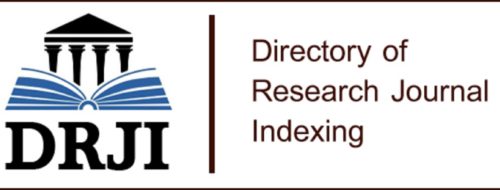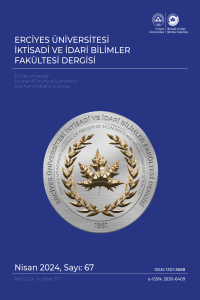Abstract
Bu çalışmada, gelişmekte olan ülkeler bağlamında e-devletin refah üzerindeki etkisi sıradan en küçük kareler yöntemi kullanılarak incelenmiştir. 2003-2020 yılları arasında mevcut verilerin ortalaması alınarak kesitsel bir veri seti oluşturulmuştur. Çalışmada temel olarak e-devletin refahı etkilediği aktarım kanalları incelenmiştir. Bu aktarım kanallarının incelenmesi, e-devletin refahın bir belirleyicisi olarak önemini vurgulamaktadır. Aktarım kanalları dikkate alındığında, e-devlet refahı açıklayan önemli bir değişken konumundadır. Çalışmanın bulgularına göre, e-devletin refahı etkilediği en önemli kanal, toplam etkinin yaklaşık %15'ini oluşturan düzenlemelerin kalitesi kanalıdır. Ayrıca yolsuzluk ve siyasi istikrar değişkenleri de e-devletin refahı etkilediği diğer aktarım kanalları olarak incelenmiştir. Bu kanallar, toplam etkinin nispeten daha küçük bir oranını oluştursa da refah üzerinde hala önemli roller oynamaktadır. Bulgular genel olarak, e-devletin refah üzerindeki etkisinin çok boyutlu doğasını vurgulamaktadır. Bu çalışma, çeşitli aktarım kanallarını dikkate alarak, gelişmekte olan ülkelerde e-devlet girişimlerinin genel refahı etkili bir şekilde artırabileceği mekanizmalar hakkında önemli bilgiler sunmaktadır.
References
- Abu–Shanab, E. A., Harb, Y. A., & Al–Zoubi, S. Y. (2013). E–government as an anti–corruption tool: Citizens perceptions. International Journal of Electronic Governance, 6(3), 232–248. https://doi.org/10.1504/IJEG.2013.058410
- Acemoglu, D., & Verdier, T. (1998). Property Rights, Corruption and the Allocation of Talent: A General Equilibrium Approach. The Economic Journal, 108(450), 1381–1403.
- Alaaraj, H., & Ibrahim, F. (2014). The Influence of E-government Practices on good governance from the perspective of Public in Lebanon. https://doi.org/10.5296/JPAG.V4I3.6405
- Al-Khateeb, A., Faloudah, A., Bahumayd, M., & Zafar, A. (2015). E-Government Strategy and its impact on Economic Development of the Nation: A Case Study of the KSA. IARJSET, 2(5), 105–110. https://doi.org/10.17148/IARJSET.2015.2522
- Almalı, V. (2021). Standart Maliyet Modeli Bağlamında E-Devlet Uygulamalarının Yönetimin İyileştirilmesi ve Refah Üzerindeki Etkileri. (Yayımlanmamış doktora tezi). Muğla Sıtkı Koçamn Üniversitesi, Sosyal Bilimler Enstitüsü, Muğla.
- Andersen, T. B. (2009). E-Government as an anti-corruption strategy. Information Economics and Policy, 21(3), 201–210. https://doi.org/10.1016/j.infoecopol.2008.11.003
- Asogwa, B. E. (2013). Electronic government as a paradigm shift for efficient public services: Opportunities and challenges for Nigerian government. Library Hi Tech, 31(1), 141–159. https://doi.org/10.1108/07378831311303985
- Basu, S. (2004). E‐government and developing countries: An overview. International Review of Law, Computers & Technology, 18(1), 109–132. https://doi.org/10.1080/13600860410001674779
- Castro, C., & Lopes, C. (2021). Digital Government and Sustainable Development. Journal of the Knowledge Economy. https://doi.org/10.1007/s13132-021-00749-2
- Cho, Y. H., & Choi, B.-D. (2004). E-Government to Combat Corruption: The Case of Seoul Metropolitan Government. International Journal of Public Administration, 27(10), 719–735. https://doi.org/10.1081/PAD-200029114
- Elbahnasawy, N. G. (2014). E-Government, Internet Adoption, and Corruption: An Empirical Investigation. World Development, 57, 114–126. https://doi.org/10.1016/j.worlddev.2013.12.005
- Garcia-Murillo, M. (2010). The effect of internet access on government corruption. Electronic Government, an International Journal, 7(1), 22–40. https://doi.org/10.1504/EG.2010.029889
- Gupta, K. P., Singh, S., & Bhaskar, P. (2018). Citizens’ perceptions on benefits of e-governance services. International Journal of Electronic Governance, 10(1), 24–55. https://doi.org/10.1504/IJEG.2018.091261
- Helbig, N., Ramón Gil-García, J., & Ferro, E. (2009). Understanding the complexity of electronic government: Implications from the digital divide literature. Government Information Quarterly, 26(1), 89–97. https://doi.org/10.1016/j.giq.2008.05.004
- Jaeger, P. T. (2002). Constitutional principles and E-government: An opinion about possible effects of Federalism and the separation of powers on E-government policies. Government Information Quarterly, 19(4), 357–368. https://doi.org/10.1016/S0740-624X(02)00119-3
- Khan, A., Krishnan, S., & Dhir, A. (2021). Electronic government and corruption: Systematic literature review, framework, and agenda for future research. Technological Forecasting and Social Change, 167, 120737. https://doi.org/10.1016/j.techfore.2021.120737
- Krishnan, S., Teo, T. S. H., & Lim, V. K. G. (2013). Examining the relationships among e-government maturity, corruption, economic prosperity and environmental degradation: A cross-country analysis. Information & Management, 50(8), 638–649. https://doi.org/10.1016/j.im.2013.07.003
- Layne, K., & Lee, J. (2001). Developing fully functional E-government: A four stage model. Government Information Quarterly, 18(2), 122–136. https://doi.org/10.1016/S0740-624X(01)00066-1
- Leff, N. H. (1964). Economic Development Through Bureaucratic Corruption. American Behavioral Scientist, 8(3), 8–14. https://doi.org/10.1177/000276426400800303
- Neupane, A., Soar, J., Vaidya, K., & Yong, J. (2014). Willingness to adopt e-procurement to reduce corruption: Results of the PLS Path modeling. Transforming Government: People, Process and Policy, 8(4), 500–520. https://doi.org/10.1108/TG-03-2014-0007
- Ojha, A., Palvia, S., & Gupta, M. (2008). A Model for Impact of E-Government on Corruption: Exploring Theoretical Foundations. Critical Thinking in E-Governance, 160–170.
- Osei-Kojo, A. (2017). E-government and public service quality in Ghana. Journal of Public Affairs, 17(3), e1620. https://doi.org/10.1002/pa.1620
- Park, C. H., & Kim, K. (2020). E-government as an anti-corruption tool: Panel data analysis across countries. International Review of Administrative Sciences, 86(4), 691–707. https://doi.org/10.1177/0020852318822055
- Pathak, R. D., & Prasad, R. (2005). Role of E-Governance in Tackling Corruption and Achieving Societal Harmony: Indian Experience. In The role of public administration in building a harmonious society (pp. 434–463). Asian Development Bank.
- Pellegrini, L. (2011). The Effect of Corruption on Growth and Its Transmission Channels. In L. Pellegrini (Ed.), Corruption, Development and the Environment (pp. 53–74). Springer Netherlands. https://doi.org/10.1007/978-94-007-0599-9_4
- Rotchanakitumnuai, S. (2013). The governance evidence of e‐government procurement. Transforming Government: People, Process and Policy, 7(3), 309–321. https://doi.org/10.1108/TG-01-2013-0004
- United Nations, (2020). United Nations e-Government Survey 2020 - Digital Government in the Decade of Action for Sustainable Development. New York: United Nations.
- Saylam, A., & Yıldız, M. (2022). Conceptualizing citizen-to-citizen (C2C) interactions within the E-government domain. Government Information Quarterly, 39(1), 101655. https://doi.org/10.1016/j.giq.2021.101655
- Shahkooh, K. A., Fasanghari, M., & Abdollahi, A. (2008). Clustering the Countries According to Relation Between E-Government and Transparency. 2008 3rd International Conference on Information and Communication Technologies: From Theory to Applications, 1–5. https://doi.org/10.1109/ICTTA.2008.4529952
- Sharma, S. K., Metri, B., Dwivedi, Y. K., & Rana, N. P. (2021). Challenges common service centers (CSCs) face in delivering e-government services in rural India. Government Information Quarterly, 38(2), 101573. https://doi.org/10.1016/j.giq.2021.101573
- Shim, D. C., & Eom, T. H. (2008). E-Government and Anti-Corruption: Empirical Analysis of International Data. International Journal of Public Administration, 31(3), 298–316. https://doi.org/10.1080/01900690701590553
- World Bank. (2015). e-Government. World Bank. Retrieved March 10, 2022, from https://www.worldbank.org/en/topic/digitaldevelopment/brief/e-government
Abstract
In this study, the effect of e-government on welfare is examined using ordinary least squares estimations for developing countries. A cross-sectional data set was created by averaging the data available between 2003 and 2020. The study basically examines the transmission channels through which e-government affects welfare. These channels serve as crucial pathways that link e-government initiatives to welfare outcomes. By examining these channels, the study seeks to unravel the significance of e-government as a determinant of welfare. When the transmission channels are considered, e-government is an essential variable that explains welfare. According to the findings of the study, the most important channel through which e-government affects welfare is regulatory quality, which accounts for about 15% of the total impact. Furthermore, the study identifies corruption and political stability as additional channels through which e-government influences welfare. These channels, although accounting for a relatively smaller proportion of the total impact, still play significant roles in shaping welfare outcomes. Overall, the findings emphasize the multi-dimensional nature of e-government's impact on welfare. By considering various transmission channels, this study provides valuable insights into the mechanisms through which e-government initiatives can effectively improve overall welfare in developing countries.
References
- Abu–Shanab, E. A., Harb, Y. A., & Al–Zoubi, S. Y. (2013). E–government as an anti–corruption tool: Citizens perceptions. International Journal of Electronic Governance, 6(3), 232–248. https://doi.org/10.1504/IJEG.2013.058410
- Acemoglu, D., & Verdier, T. (1998). Property Rights, Corruption and the Allocation of Talent: A General Equilibrium Approach. The Economic Journal, 108(450), 1381–1403.
- Alaaraj, H., & Ibrahim, F. (2014). The Influence of E-government Practices on good governance from the perspective of Public in Lebanon. https://doi.org/10.5296/JPAG.V4I3.6405
- Al-Khateeb, A., Faloudah, A., Bahumayd, M., & Zafar, A. (2015). E-Government Strategy and its impact on Economic Development of the Nation: A Case Study of the KSA. IARJSET, 2(5), 105–110. https://doi.org/10.17148/IARJSET.2015.2522
- Almalı, V. (2021). Standart Maliyet Modeli Bağlamında E-Devlet Uygulamalarının Yönetimin İyileştirilmesi ve Refah Üzerindeki Etkileri. (Yayımlanmamış doktora tezi). Muğla Sıtkı Koçamn Üniversitesi, Sosyal Bilimler Enstitüsü, Muğla.
- Andersen, T. B. (2009). E-Government as an anti-corruption strategy. Information Economics and Policy, 21(3), 201–210. https://doi.org/10.1016/j.infoecopol.2008.11.003
- Asogwa, B. E. (2013). Electronic government as a paradigm shift for efficient public services: Opportunities and challenges for Nigerian government. Library Hi Tech, 31(1), 141–159. https://doi.org/10.1108/07378831311303985
- Basu, S. (2004). E‐government and developing countries: An overview. International Review of Law, Computers & Technology, 18(1), 109–132. https://doi.org/10.1080/13600860410001674779
- Castro, C., & Lopes, C. (2021). Digital Government and Sustainable Development. Journal of the Knowledge Economy. https://doi.org/10.1007/s13132-021-00749-2
- Cho, Y. H., & Choi, B.-D. (2004). E-Government to Combat Corruption: The Case of Seoul Metropolitan Government. International Journal of Public Administration, 27(10), 719–735. https://doi.org/10.1081/PAD-200029114
- Elbahnasawy, N. G. (2014). E-Government, Internet Adoption, and Corruption: An Empirical Investigation. World Development, 57, 114–126. https://doi.org/10.1016/j.worlddev.2013.12.005
- Garcia-Murillo, M. (2010). The effect of internet access on government corruption. Electronic Government, an International Journal, 7(1), 22–40. https://doi.org/10.1504/EG.2010.029889
- Gupta, K. P., Singh, S., & Bhaskar, P. (2018). Citizens’ perceptions on benefits of e-governance services. International Journal of Electronic Governance, 10(1), 24–55. https://doi.org/10.1504/IJEG.2018.091261
- Helbig, N., Ramón Gil-García, J., & Ferro, E. (2009). Understanding the complexity of electronic government: Implications from the digital divide literature. Government Information Quarterly, 26(1), 89–97. https://doi.org/10.1016/j.giq.2008.05.004
- Jaeger, P. T. (2002). Constitutional principles and E-government: An opinion about possible effects of Federalism and the separation of powers on E-government policies. Government Information Quarterly, 19(4), 357–368. https://doi.org/10.1016/S0740-624X(02)00119-3
- Khan, A., Krishnan, S., & Dhir, A. (2021). Electronic government and corruption: Systematic literature review, framework, and agenda for future research. Technological Forecasting and Social Change, 167, 120737. https://doi.org/10.1016/j.techfore.2021.120737
- Krishnan, S., Teo, T. S. H., & Lim, V. K. G. (2013). Examining the relationships among e-government maturity, corruption, economic prosperity and environmental degradation: A cross-country analysis. Information & Management, 50(8), 638–649. https://doi.org/10.1016/j.im.2013.07.003
- Layne, K., & Lee, J. (2001). Developing fully functional E-government: A four stage model. Government Information Quarterly, 18(2), 122–136. https://doi.org/10.1016/S0740-624X(01)00066-1
- Leff, N. H. (1964). Economic Development Through Bureaucratic Corruption. American Behavioral Scientist, 8(3), 8–14. https://doi.org/10.1177/000276426400800303
- Neupane, A., Soar, J., Vaidya, K., & Yong, J. (2014). Willingness to adopt e-procurement to reduce corruption: Results of the PLS Path modeling. Transforming Government: People, Process and Policy, 8(4), 500–520. https://doi.org/10.1108/TG-03-2014-0007
- Ojha, A., Palvia, S., & Gupta, M. (2008). A Model for Impact of E-Government on Corruption: Exploring Theoretical Foundations. Critical Thinking in E-Governance, 160–170.
- Osei-Kojo, A. (2017). E-government and public service quality in Ghana. Journal of Public Affairs, 17(3), e1620. https://doi.org/10.1002/pa.1620
- Park, C. H., & Kim, K. (2020). E-government as an anti-corruption tool: Panel data analysis across countries. International Review of Administrative Sciences, 86(4), 691–707. https://doi.org/10.1177/0020852318822055
- Pathak, R. D., & Prasad, R. (2005). Role of E-Governance in Tackling Corruption and Achieving Societal Harmony: Indian Experience. In The role of public administration in building a harmonious society (pp. 434–463). Asian Development Bank.
- Pellegrini, L. (2011). The Effect of Corruption on Growth and Its Transmission Channels. In L. Pellegrini (Ed.), Corruption, Development and the Environment (pp. 53–74). Springer Netherlands. https://doi.org/10.1007/978-94-007-0599-9_4
- Rotchanakitumnuai, S. (2013). The governance evidence of e‐government procurement. Transforming Government: People, Process and Policy, 7(3), 309–321. https://doi.org/10.1108/TG-01-2013-0004
- United Nations, (2020). United Nations e-Government Survey 2020 - Digital Government in the Decade of Action for Sustainable Development. New York: United Nations.
- Saylam, A., & Yıldız, M. (2022). Conceptualizing citizen-to-citizen (C2C) interactions within the E-government domain. Government Information Quarterly, 39(1), 101655. https://doi.org/10.1016/j.giq.2021.101655
- Shahkooh, K. A., Fasanghari, M., & Abdollahi, A. (2008). Clustering the Countries According to Relation Between E-Government and Transparency. 2008 3rd International Conference on Information and Communication Technologies: From Theory to Applications, 1–5. https://doi.org/10.1109/ICTTA.2008.4529952
- Sharma, S. K., Metri, B., Dwivedi, Y. K., & Rana, N. P. (2021). Challenges common service centers (CSCs) face in delivering e-government services in rural India. Government Information Quarterly, 38(2), 101573. https://doi.org/10.1016/j.giq.2021.101573
- Shim, D. C., & Eom, T. H. (2008). E-Government and Anti-Corruption: Empirical Analysis of International Data. International Journal of Public Administration, 31(3), 298–316. https://doi.org/10.1080/01900690701590553
- World Bank. (2015). e-Government. World Bank. Retrieved March 10, 2022, from https://www.worldbank.org/en/topic/digitaldevelopment/brief/e-government
Details
| Primary Language | English |
|---|---|
| Subjects | Cross-Sectional Analysis, Political Economy, Welfare Economics |
| Journal Section | Makaleler |
| Authors | |
| Early Pub Date | April 28, 2024 |
| Publication Date | April 30, 2024 |
| Acceptance Date | February 15, 2024 |
| Published in Issue | Year 2024 Issue: 67 |













ERÜ İktisadi ve İdari Bilimler Fakültesi Dergisi 2021 | iibfdergi@erciyes.edu.tr
Bu eser Creative Commons Atıf-Gayri Ticari-Türetilemez 4.0 Uluslararası Lisansı ile lisanslanmıştır.



